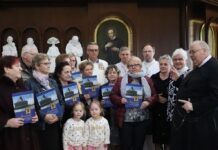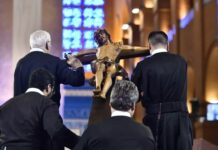Introduction
In this Easter season, each and every one of us experiences the mysterious “passage” of the Risen Lord from death into life. We live this Paschal Mystery in our daily lives, as individuals and as community. In light of this, we are all invited to make a “passage” from death to life as we live, in concrete ways in our own situations, our Redemptorist vocation. As we make this “passage,” the Lord opens our minds and hearts, and also inspires us to understand what salvific role our Congregation plays in today’s world.
In this atmosphere of light, and in expectation for the gifts of the Spirit, we would like to continue our reflections on the final message of the General Chapter to the Congregation. In this issue of One Body, we will take into consideration the third paragraph, entitled: A Congregation Sent Forth.
During the Chapter, the call of Pope Francis resounded strongly to “go forth from your own comfort zone in order to reach all the ‘peripheries’ in need of the light of the Gospel (EG20),” and to evaluate our structures because such structures “can hamper efforts at evangelization” (EG26; Cf. Cons. 15). In this context, our missionary vocation in the Church takes on new and timely significance.
Our Constitutions remind us to respond “with missionary thrust to the pressing pastoral need of the most abandoned, especially the poor” (C. 1). Will we have the courage to ask ourselves where are these peripheries in our Units that need our presence and our evangelizing activity? Are we ready and willing to demonstrate our missionary availability? Each Unit should be attentive to these areas of urgent need, paying special attention to young people, migrants, and the most disadvantaged people.
The text of the message urges us to do two things, both of which are necessary for the vitality of our Congregation: go forth and evaluate. At first glance, the prospect of performing these actions can discourage us, for we can have the sense that we have done this so many times before. But if we want to stay in touch with today’s world and its realities, if we want to continue to respond in fidelity with creative compassion, we will probably have to repeat this pattern again and again: go forth (act) and evaluate (stand back and take stock in order to move forward again in hope).
Our Congregation goes forth with its history and traditions, with its strengths and weaknesses, with its hopes and challenges. What is important is that we are aware that the charism given by God, and perceived by Alphonsus and his first companions. has to be applied in concrete ways in the present situation. The testimony of past generations of Redemptorists gives us courage and fills us with gratitude, but we cannot stop there. It is not enough to copy the past or keep doing what we have “always done before.” We have to embrace the past with gratitude, and then set our charts for the future. Even when it seems as if our vitality and dynamism is very limited, what urges us onward is the missionary awareness that there are zones and territories around us that are in need of the light of the Gospel (EG 20).
We are also invited to evaluate our mission and ministry. In this step, we are not invited to impress each other by our little or great successes, but to be faithful to the call we have received. The process of evaluation must be conducted in a spirit of great sincerity and truth concerning the quality of our apostolic life and the evangelical “efficiency” of our structures. It is not about demolishing the structures, but rather about asking if they are still “evangelical” and, if not, how to make them “evangelical again”. Structures exist in order to make the work more efficient and organized. Structures are at the service of mission and ministry. Sometimes, if they do not really serve for apostolic purpose, structures can make us less generous in responding to the signs of our time and in accepting new challenges.
In this context, how would we respond to the questions posed in this paragraph of the General Chapter message:
Will we have the courage to ask ourselves where are these peripheries in our Units that need our presence and our evangelizing activity?
Are we ready and willing to demonstrate our missionary availability?
The word of God is my light
Let us read the passage of the Gospel according to John, chapter 21, verses 1-14. It recounts how the Risen Lord appeared to His disciples for the third time. The story starts with Peter’s decision to “return to his previous life”, to his old profession. The others follow him. When Jesus appears, only the beloved disciple is able to perceive Jesus’ identity, Who He really is. This is possible because the beloved disciple does not depend only on the logic of appearance, but uses also the logic of love and heart. Then, the story continues with the abundant catch and finishes with the conviction: And none of the disciples dared to ask him, “Who are you?” because they realized it was the Lord.
This story is about a passage or a journey from doubt and disappointment into certainty and light. It is a Paschal journey. In this story, we see Peter (the group leader) returning to the old way of living. Perhaps deep in his heart he remembered the days when he left his job of being a fisherman to become the fisher of men. It was Jesus who called him and it was Jesus who made him the fisher of men. Now Jesus is not here, and the temptation arises to return to the old, “secure,” tradition. And the others follow him. They go back to their old jobs. They do not even recognize Jesus when he appears. Only the disciple whom Jesus loved, driven by the logic of heart and love, is able to cry out, “It is the Lord!” In the story, the disciples say almost nothing, but at the very end they are convinced that it is the Lord who appeared to them. His presence makes them believers again. What about us?
Do we recognize Jesus, the Lord, in those who live in the peripheries far away from light of the Gospel?
Are we not tempted to believe, in moments of difficulties and disappointments, that it is easier or “better” to choose the old “secure” options?
Drinking from our well
Let us read some words from a letter written by Fr. Fabrizio Cimino on behalf of Saint Alphonsus in July of 1758. Even though they are written in a dated style and language, we can catch the spirit and the intentions of the author. In these words, we can touch and feel the zeal and passion of our early confreres to go and bring the light of the Gospel to those who were abandoned and forgotten:
Nocera, July 18, 1758
My dear Father and Fratres in Jesus Christ: I have been requested by our father to communicate to you the news that he has been asked to send young men to the foreign missions in Asia. (…) Behold then here is a vast field opened before us in which the harvest is ready and waiting to be gathered in by laborers animated with apostolic zeal. Look at those unfortunate nations bathed in tears and raising a suppliant voice to heaven, to conjure the Lord to send you to them. (…) In their extreme poverty, they ask for nothing else but to be returned to the bosom of the Church. It is you whom they supplicate; you, I say, who have shown yourselves so generous towards your fellow-countrymen; it is you whom they conjure not to value their souls less than those of your own people. They have but the same Creator, they were formed of the same substance, and have as much right as we have to the blood of our Lord Jesus Christ. One might almost say that there is a duty of justice that should urge us to carry the light of truth into the country whence we have received it.
If the journey frightens you, they promise to recompense you by a most affectionate reception; if the inconvenience make you shudder, they assure you of a rich harvest. If the fatigue that you would have to endure causes you to fear, you should be encouraged by the eternal reward that awaits you. And what reason can we have for not coming to their assistance?
My Fathers and Brothers, I feel certain that a number of you will express to me your desire not to lose the crown that the Lord deigns to offer you with His blessed hands – a crown with which I wish to see the forehead of each one of you adorned in our heavenly home.
In conclusion I recommend myself to your prayers, and while humbly kissing your hands I sign myself.
Your servant and Brother in Jesus Christ,
Fabrizio Cimino
of the Most Holy Redeemer
Reflect and Discuss:
As those who bring the light of the Gospel to those who are in need of that light, can we find in this text an invitation to revise our spirit and structures in order to respond more willingly to the apostolic need of those who live around us?
Do we feel, deep within ourselves, that we are responsible for carrying on the charism of the Congregation given us by God?
——————————————————————————————
ONE BODY is a monthly text of prayer proposed by the Center for Redemptorist Spirituality. For more information:
Fr. Piotr Chyla CSsR (Director of the Center for Spirituality – fr.chyla@gmail.com).







